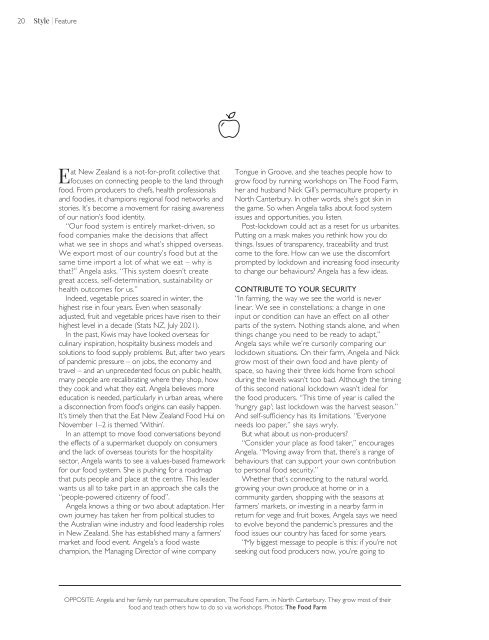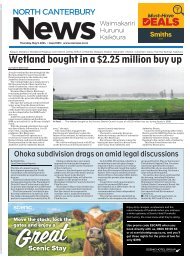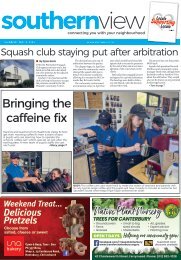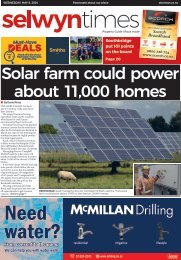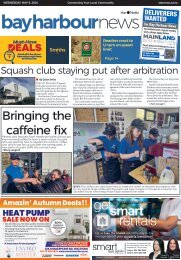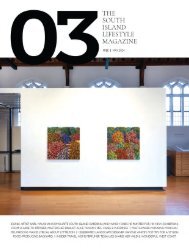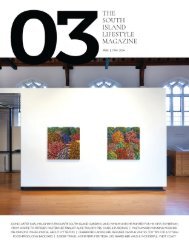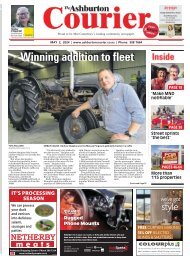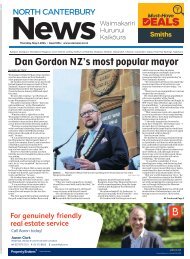You also want an ePaper? Increase the reach of your titles
YUMPU automatically turns print PDFs into web optimized ePapers that Google loves.
20 <strong>Style</strong> | Feature<br />
Eat New Zealand is a not-for-profit collective that<br />
focuses on connecting people to the land through<br />
food. From producers to chefs, health professionals<br />
and foodies, it champions regional food networks and<br />
stories. It’s become a movement for raising awareness<br />
of our nation’s food identity.<br />
“Our food system is entirely market-driven, so<br />
food companies make the decisions that affect<br />
what we see in shops and what’s shipped overseas.<br />
We export most of our country’s food but at the<br />
same time import a lot of what we eat – why is<br />
that?” Angela asks. “This system doesn’t create<br />
great access, self-determination, sustainability or<br />
health outcomes for us.”<br />
Indeed, vegetable prices soared in winter, the<br />
highest rise in four years. Even when seasonally<br />
adjusted, fruit and vegetable prices have risen to their<br />
highest level in a decade (Stats NZ, July <strong>2021</strong>).<br />
In the past, Kiwis may have looked overseas for<br />
culinary inspiration, hospitality business models and<br />
solutions to food supply problems. But, after two years<br />
of pandemic pressure – on jobs, the economy and<br />
travel – and an unprecedented focus on public health,<br />
many people are recalibrating where they shop, how<br />
they cook and what they eat. Angela believes more<br />
education is needed, particularly in urban areas, where<br />
a disconnection from food’s origins can easily happen.<br />
It’s timely then that the Eat New Zealand Food Hui on<br />
November 1–2 is themed ‘Within’.<br />
In an attempt to move food conversations beyond<br />
the effects of a supermarket duopoly on consumers<br />
and the lack of overseas tourists for the hospitality<br />
sector, Angela wants to see a values-based framework<br />
for our food system. She is pushing for a roadmap<br />
that puts people and place at the centre. This leader<br />
wants us all to take part in an approach she calls the<br />
“people-powered citizenry of food”.<br />
Angela knows a thing or two about adaptation. Her<br />
own journey has taken her from political studies to<br />
the Australian wine industry and food leadership roles<br />
in New Zealand. She has established many a farmers’<br />
market and food event. Angela’s a food waste<br />
champion, the Managing Director of wine company<br />
Tongue in Groove, and she teaches people how to<br />
grow food by running workshops on The Food Farm,<br />
her and husband Nick Gill’s permaculture property in<br />
North Canterbury. In other words, she’s got skin in<br />
the game. So when Angela talks about food system<br />
issues and opportunities, you listen.<br />
Post-lockdown could act as a reset for us urbanites.<br />
Putting on a mask makes you rethink how you do<br />
things. Issues of transparency, traceability and trust<br />
come to the fore. How can we use the discomfort<br />
prompted by lockdown and increasing food insecurity<br />
to change our behaviours? Angela has a few ideas.<br />
CONTRIBUTE TO YOUR SECURITY<br />
“In farming, the way we see the world is never<br />
linear. We see in constellations; a change in one<br />
input or condition can have an effect on all other<br />
parts of the system. Nothing stands alone, and when<br />
things change you need to be ready to adapt,”<br />
Angela says while we’re cursorily comparing our<br />
lockdown situations. On their farm, Angela and Nick<br />
grow most of their own food and have plenty of<br />
space, so having their three kids home from school<br />
during the levels wasn’t too bad. Although the timing<br />
of this second national lockdown wasn’t ideal for<br />
the food producers. “This time of year is called the<br />
‘hungry gap’; last lockdown was the harvest season.”<br />
And self-sufficiency has its limitations. “Everyone<br />
needs loo paper,” she says wryly.<br />
But what about us non-producers?<br />
“Consider your place as food taker,” encourages<br />
Angela. “Moving away from that, there’s a range of<br />
behaviours that can support your own contribution<br />
to personal food security.”<br />
Whether that’s connecting to the natural world,<br />
growing your own produce at home or in a<br />
community garden, shopping with the seasons at<br />
farmers’ markets, or investing in a nearby farm in<br />
return for vege and fruit boxes, Angela says we need<br />
to evolve beyond the pandemic’s pressures and the<br />
food issues our country has faced for some years.<br />
“My biggest message to people is this: if you’re not<br />
seeking out food producers now, you’re going to<br />
OPPOSITE: Angela and her family run permaculture operation, The Food Farm, in North Canterbury. They grow most of their<br />
food and teach others how to do so via workshops. Photos: The Food Farm


